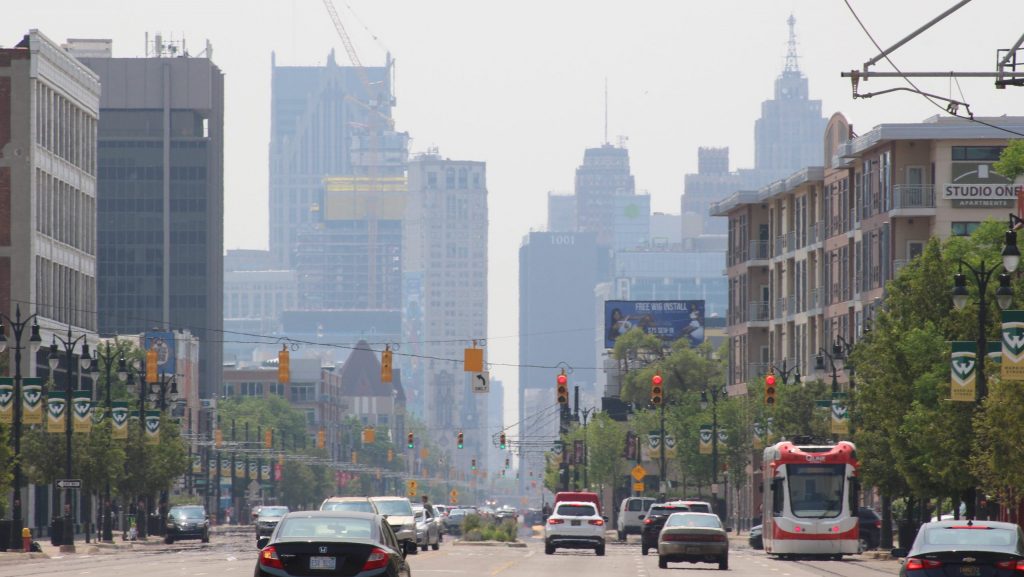The Metro: ‘Heat island effect’ contributing to warmer temperatures in Detroit, research shows
The Metro May 17, 2024Urban communities in the U.S. experience temperature increases of up to 10 degrees Fahrenheit compared to rural environments due to the heat island effect, the nonprofit Climate Central reports.

A photo of the Detroit skyline on June 7, 2023.
As global temperatures continue to rise due to climate change, environmental factors in some urban communities are amplifying the heat even further.
Heat islands are defined as urbanized areas that experience higher temperatures than more rural areas due to the prevalence of buildings, roads and other infrastructure that absorbs and re-emits the sun’s heat more than natural landscapes such as forests and water bodies.
In 2023, the nonprofit Climate Central found that the urban “heat island effect” is elevating local temperatures by at least eight degrees Fahrenheit in 44 U.S. cities — including Detroit — exposing residents to higher risks of heat-related illness and higher cooling costs. In some cities, like Chicago, New York City and San Francisco, the effect can boost temperatures by 10 degrees or more, the organization reported.
Subscribe to The Metro on Apple Podcasts, Spotify, NPR.org or wherever you get your podcasts.
Jen Brady, a senior data analyst at Climate Central, joined The Metro on Friday to explain the heat island effect and offer suggestions for how to cool down urban communities in metro Detroit. She says many factors can contribute to the heat island effect, including the way a city is designed.
“Sometimes it’s just the design of the city, how the city grows. Detroit is an old city with lots of old buildings, old structures, stone structures left of pavement. So it may just be how the city has grown over the years,” Brady said. “A lot of northern cities are actually designed to hold heat in because we think of the cold weather in the winter. And we want to hold that heat in. But now that’s becoming a problem.”
Planting more trees in urban landscapes, having green roofs, and painting roofs and pavement lighter colors could help to reduce the heat island effect, Brady says, but emphasized that there must be a joint effort within the community to see real results.
“Because the other thing is, if you have a whole neighborhood, it’s very warm, and one person lightens the roof, it’s not going to really lighten the whole neighborhood. So, it really needs to be a big collective effort,” she said.
Many nonprofits and municipalities in the U.S. are already working towards warding off scorching temperatures by planting trees. Right here in Detroit, the nonprofit The Greening of Detroit plans to plant 70,000 trees over the next five years, which can help scatter the heat and provide more shade.
Use the media player above to hear the full interview with Brady.
More headlines from The Metro on May 17, 2024:
- Today marks 70 years since the U.S. Supreme Court’s Brown v. Board of Education decision. Terah Chambers, the associate dean for Michigan State University’s College of Education, joined the show to discuss how the landmark case has affected the education system and its future direction.
- A group of metro Detroiters sent a letter to Gov. Gretchen Whitmer and Detroit Mayor Mike Duggan this week asking them to revisit ideas for the future of I-375 in downtown Detroit. Their concerns included a lack of community engagement, vision, safety, urban design, and restorative justice for those affected by the freeway’s original construction. Michigan Department of Transportation senior project manager Jon Loree joined the show to provide a response to the negative feedback from residents about the project.
- According to a new study from Michigan State University, many U.S. workers find the jobs available to them boring. WDET’s Bre’Anna Tinsley spoke with Kevin Hoff, lead researcher on the report, about what can be done to help bridge the gap between the workforce and the work.
- The Detroit Women of Comedy Festival is taking place this Friday and Saturday at the Planet Ant Theatre in Hamtramck. The show’s producer, Kate Holmes, joined the show to share more about the unique event.
Listen to The Metro weekdays from 11 a.m. to noon ET on 101.9 FM and streaming on-demand.
Trusted, accurate, up-to-date.
WDET strives to make our journalism accessible to everyone. As a public media institution, we maintain our journalistic integrity through independent support from readers like you. If you value WDET as your source of news, music and conversation, please make a gift today.
